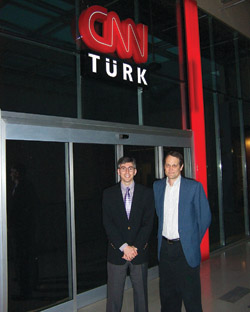Viewpoint: Perspectives from Turkey
By Mark Feldstein

|

Journalism program director Mark Feldstein
(right) at CNN Turk’s headquarters
in Istanbul.
|
Istanbul, Turkey, a teeming metropolis of 15
million people, has a rich and globally significant
history. Previously known as Constantinople and
the capital of the Byzantine Empire, Istanbul
is the only city on the planet that straddles
two continents, Europe and Asia; a crucial strategic
Mediterranean port in both ancient Greece and
Rome as well as early Christendom and the Moslem
Ottoman Empire. During the Cold War, Turkey also
was a key American ally against communism.
And Turkey might become an equally significant
geopolitical player in the years ahead. Turkey
faces potential admission to the European Union,
which would bolster its growing economy and more
fully integrate it into the West. Turkey also
is a pivotal Middle Eastern bellwether in the
war on terrorism led by the United States. But
unfortunately, the signs here are not encouraging.
For the past year, I have been part of a cultural
exchange program sponsored by the Department of
State between Turkish and American journalists
that culminated this spring in a weeklong visit
to Turkey. We discussed topics including programs;
globalization and the media; journalistic coverage
of politics and government; changing media technologies;
bias and sensationalism; censorship; and freedom
of the press.
But Turkish journalists and students repeatedly
wanted to talk not about media issues, but about
American foreign policy. Time after time, in questions
and comments, in casual conversations and more
formal talks, in light jokes and intense harangues,
Turkish citizens angrily denounced the war in
Iraq: How could Americans invade a neighboring
Muslim country that hadn’t attacked the
United States? How could a nation that Turks had
so admired kill an estimated 100,000 Iraqi civilians?
How could U.S. soldiers commit such gruesome crimes
at Abu Gharib and Guantanamo Bay?
They were tough questions and there were no
easy answers. I tried to explain that I was just
an American professor, not a spokesman for the
U.S. government or an architect of its policies.
But that seemed to make little difference. In
many Turkish eyes, the fact that I was an American
was reason enough to channel their anger my way.
After all, it was my country’s military
that attacked Iraq, an invasion that was carried
out in my name and in the names of every other
American citizen. It was hard to know what to
say.
To be sure, Turkey is hardly alone in its new-found
anti-Americanism; even long-standing U.S. allies
in Western Europe have been estranged since the
invasion of Iraq. Hopefully this chill will eventually
thaw in the future, though many experts fear it
could take years—if not an entire generation—for
America to regain the moral high ground.
In Turkey, most people I talked to were careful
to distinguish between the politicians of the
U.S. and its people. “We love Americans,”
was a constant refrain, “but not your government.”
Political differences notwithstanding, the Turks
are warm and generous hosts, good-hearted and
spontaneous.
But Turkish suspicion of the United States should
not be underestimated. The country’s most
popular film is an anti-American polemic about
a fictional U.S. invasion of Turkey, complete
with a subplot involving Jewish physicians who
buy the body parts of unsuspecting Muslims in
the process. At the University of Istanbul, fully
half of the audience of some 200 students raised
their hands when I asked how many of them believed
the fantasy flick represents reality.
It was a sobering reaction considering the fact
that Turkey is probably the most modern and secular
Muslim country in the Middle East, a long-time
ally known for being more stable and reliable—and
more pro-American—than any other Islamic
nation in the region.
President Bush may claim that America’s
enemies in the Middle East hate us for our freedoms.
But if my recent experience in Turkey is any guide,
what they really hate are not our freedoms, but
our policies.
Mark Feldstein, School of Media and Public
Affairs associate professor, is director of GW’s
journalism program and a member of the advisory
board of the GW Center for the Study of Globalization.
|